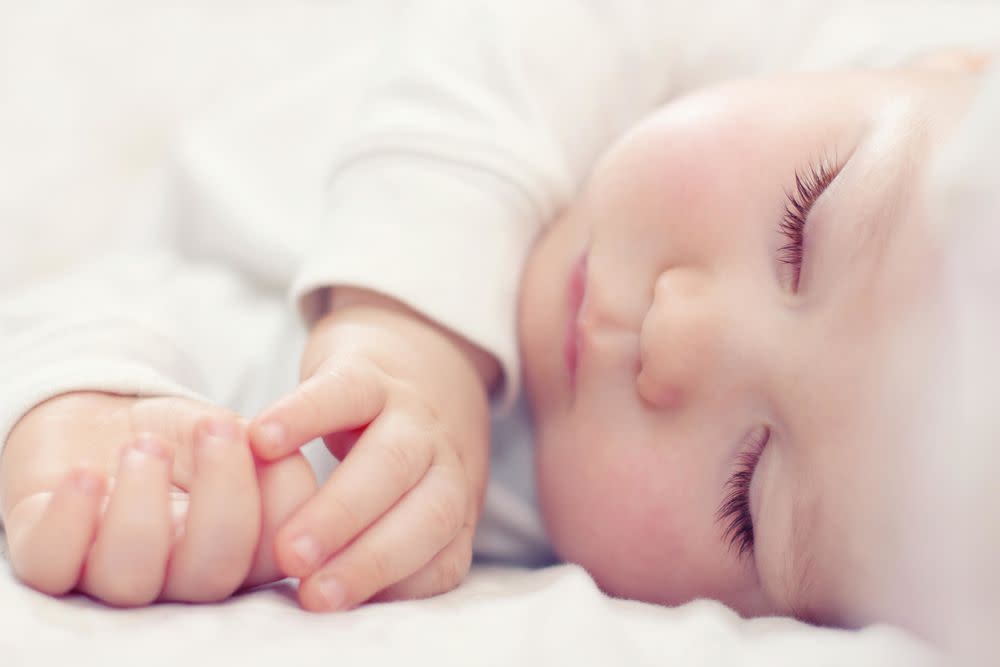Could 'Breastsleeping' Mean More Sleep For Moms?

The term might raise a few eyebrows but according to world-renowned sleep expert James McKenna, Ph.D., director of the Mother-Baby Behavioral Sleep Laboratory at the University of Notre Dame, "breastsleeping" is an ideal sleep arrangement for new mothers and their infants.
McKenna wrote a peer-reviewed commentary piece recently called "There is No Such Thing as Infant Sleep, There is No Such Thing as Breastfeeding, There is Only Breastsleeping" to present the concept, which is exactly what it sounds like: Bed-sharing combined with breastfeeding throughout the night. The piece, which was co-authored by Notre Dame assistant professor Lee Gettler, Ph.D., argues that breastsleeping is a much safer sleep configuration for mothers and their infants.
"When a mother breastfeeds her baby and then bed shares, it's a much, much safer environment than if a mother were bottle feeding and bed-sharing," McKenna says. "We know that the breastsleeping mother/baby pair both sleep in lighter stages, which makes them more sensitive to the behavior of the other. When babies are bottle fed, they move around a lot and have a much harder time waking up to breathe."
RELATED: Are You Making These Baby-Sleep Safety Mistakes?
The Risk of Suffocation
But not all experts are on board with this arrangement.
"The recommendation from the American Academy of Pediatrics is that an infant be placed in a crib with a tight-fitting sheet over a firm mattress. There should be nothing else in the bed—no pillows, no blankets, no stuffed animals. Bed-sharing is not recommended," says Diane Ashton, M.D., deputy director of medical affairs at March of Dimes. "[Breastsleeping] appears to be equivalent to bed-sharing so I would assume that the risk is the same."
Ashton cites suffocation, entrapment in pillows or blankets, falling out of the bed or being suffocated by the parents themselves as potential dangers associated with bed-sharing.
"There was a recent study that came out where they had looked at a large number of infant deaths and identified that almost 70 percent were associated with bed-sharing," Ashton says.
RELATED: New Ways to Reduce the Risk of SIDS
Better Sleep for Moms?
It's never worth putting your baby in danger, but there's one incredibly compelling argument for McKenna's proposed model.
"It's so much more convenient for mothers in terms of not getting up three or four times a night every time the baby wants to feed," McKenna says. He also mentions that breastsleeping mothers can expect to get about an hour more sleep per night than their solitary sleeping counterparts.
"The solitary sleeping moms lost that sleep when they were trying to get the baby back to bed," McKenna explained. "We've learned that [when the baby cries after feeding,] it's not the baby wants more milk, it's that they want the contact with the mother. I call them contact seekers. These are the kinds of things that make breastsleeping a real human activity. This is human behavior not subject to nullification," McKenna says.
RELATED: 19 Sleep Tricks for Moms
More Time to Nurse
McKenna and Gettler's piece mentions that bed-sharing can double or even triple the number of times an infant is breastfed through the night as well as the idea that being breastfed often may ward off sudden infant death syndrome (SIDS).
"[Breastsleeping] helps mom manage her milk supply much better and the value of breast milk is even greater when the dosages go up," McKenna says. McKenna and Gettler also point out that there are other factors at work—like sleep position, drug/alcohol use, pacifier use and whether or nor the infant was being breastfed at the time of death—which can alter bed-sharing statistics.
Ashton agrees that mothers tend to be sleep-deprived in the first few months of infancy, but continues to advocate for parents and their infants to sleep separately. "You have to weigh the risks and the benefits and the risks are clear. I think that really has to be taken seriously when parents are making these decisions," she says.
RELATED: How to Protect Against SIDS

